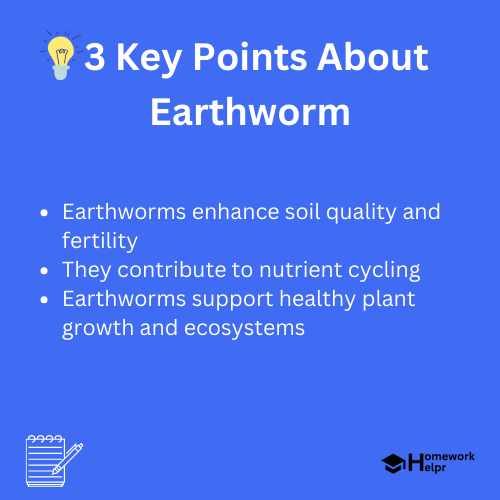📝 Summary
Earthworms are vital ecosystem engineers that enhance soil health and promote plant growth. They belong to the family Lumbricidae and thrive in moist, organic-rich soil. With a unique anatomy including segments, clitellum, and setae, they efficiently burrow and feed on decaying matter, recycling nutrients. Their activities facilitate soil aeration, nutrient cycling, and erosion control, making them essential for agriculture and the environment. Understanding and supporting earthworm populations can greatly benefit our ecosystems and gardens. Overall, they play a crucial role in the health of our planet.
Understanding Earthworms: Nature’s Underground Heroes
Earthworms are remarkable creatures that play a vital role in maintaining a healthy ecosystem. These segmented animals belong to the family Lumbricidae and are commonly found in soil rich in organic matter. Through their tireless work, earthworms enhance soil quality, promote plant growth, and contribute to a balanced ecosystem. In this article, we will delve deeper into the lives of earthworms, their anatomy, habitat, and the benefits they provide to our environment.
The Anatomy of Earthworms
Earthworms have a fascinating and unique anatomy that enables them to thrive underground. The body of an earthworm is divided into segments, or metameres, which help them move through the soil effortlessly. Each segment contains muscle layers and can expand or contract to facilitate movement.

Some key features of earthworm anatomy include:
- Clitellum: This thickened, glandular section of the body is crucial for reproduction.
- Setae: Tiny bristle-like structures that help earthworms grip the soil as they move.
- Nephridia: The excretory organs that help remove waste products from their body.
Definition
Metameres: Segmented divisions of the earthworm‚’ body that help it move smoothly.
Habitat of Earthworms
Earthworms prefer damp, dark environments where they can burrow into rich loamy soil. They thrive in areas with abundant organic matter, such as forests, gardens, and agricultural fields. Earthworms help to aerate the soil and improve its drainage, contributing to better plant growth.
In their natural habitat, earthworms perform two main activities: burrowing and feeding. Burrowing allows them to find food and escape from predators, while feeding involves consuming decaying organic material, thereby recycling nutrients back into the soil.
Examples
For instance, if you have a garden, you can often find earthworms in the soil, where they help break down fallen leaves and other organic waste.
The Role of Earthworms in Ecosystems
Earthworms are known as ecosystem engineers due to their pivotal role in enhancing soil quality. Here are some ways in which they contribute:
- Nutrient Cycling: Earthworms break down organic matter, turning it into nutrient-rich castings that are essential for plant growth.
- Soil Aeration: Their burrowing activities create channels in the soil, allowing air, water, and roots to penetrate deeper.
- Erosion Control: By stabilizing the soil, earthworms help prevent erosion, maintaining the integrity of the landscape.
❓Did You Know?
Did you know that a single earthworm can consume about half its body weight in organic matter each day?
Reproduction and Lifespan
Earthworms are hermaphrodites, meaning each individual has both male and female reproductive organs. During reproduction, two earthworms come together and exchange sperm. The clitellum forms a mucus ring, which encapsulates the fertilized eggs, protecting them until they hatch.
Earthworm lifespan can vary significantly based on their environment. In general, they can live for several years, sometimes up to a decade, depending on factors such as habitat conditions and predation. However, their populations can rebound quickly due to their reproductive capacity.
Examples
For example, if you observe a garden bed, a few earthworms can quickly multiply, helping to enhance the soil’s nutrient composition over time.
Benefits of Earthworms to Humans
Aside from their ecological benefits, earthworms have numerous advantages for humans as well. Here are some key contributions:
- Soil Fertility: By enriching the soil with castings, earthworms promote agriculture and better crop yields.
- Composting: Earthworms are commonly used in vermicomposting, a process where organic waste is converted into high-quality compost.
- Natural Pest Control: Healthy soils full of earthworms can support beneficial organisms that help control pest populations naturally.
Definition
Vermicomposting: A composting method that involves using earthworms to break down organic waste into nutrient-rich compost.
How to Encourage Earthworms in Your Garden
If you’re eager to attract more earthworms to your garden, there are several simple steps you can follow:
- Maintain Moisture: Keep the soil consistently moist, as earthworms prefer damp environments.
- Avoid Chemicals: Minimize the use of pesticides and chemicals that can harm earthworm populations.
- Add Organic Matter: Incorporate compost and organic materials into the soil to provide food for earthworms.
Examples
For instance, adding kitchen scraps or shredded leaves to the soil can create a hospitable environment for earthworms to thrive.
Conclusion
In summary, earthworms are extraordinary creatures that have an instrumental role in maintaining a healthy ecosystem. Their contributions extend beyond the soil to impact agriculture, pest management, and overall biodiversity. By understanding their anatomy, habitat, and benefits, we can appreciate these underground heroes and take steps to encourage their presence in our gardens and natural environments.
Next time you see an earthworm, remember the vital role it plays in the grand tapestry of life that supports our planet. Protecting and nurturing these creatures is essential to our environment’s health and sustainability.
Related Questions on Earthworm
What roles do earthworms play in the ecosystem?
Answer: They enhance soil quality and promote plant growth.
How do earthworms reproduce?
Answer: They are hermaphrodites and exchange sperm.
What is vermicomposting?
Answer: A process using earthworms to create nutrient-rich compost.
How can I attract earthworms to my garden?
Answer: Maintain moisture, avoid chemicals, and add organic matter.
